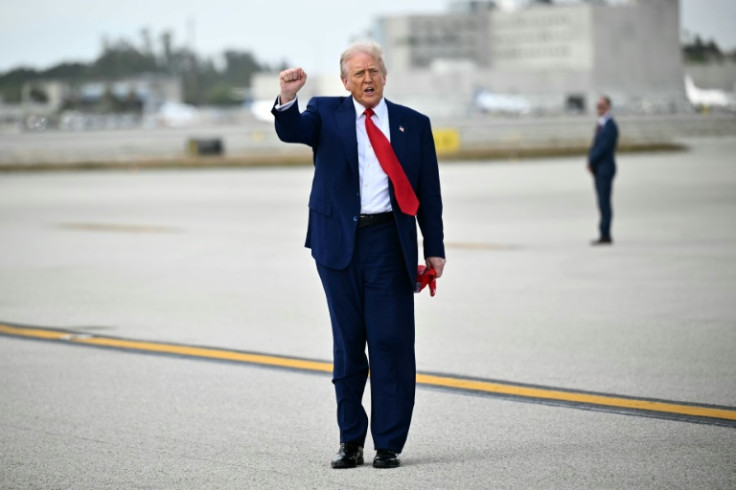Small Businesses Sue Trump Over Tariffs In US Court Of International Trade

A group of small businesses has filed a lawsuit in the U.S. Court of International Trade challenging President Donald Trump's sweeping tariffs on imported goods.
The lawsuit, filed by the nonpartisan Liberty Justice Center on behalf of five small businesses, argues that Trump exceeded his legal authority by imposing sweeping tariffs on imports from multiple countries, Reuters reported. It claims Trump unlawfully seized Congress's authority to levy tariffs and calls his justification — treating trade deficits as a national emergency — baseless.
"No one person should have the power to impose taxes that have such vast global economic consequences," Liberty Justice Center senior counsel Jeffrey Schwab stated. "The Constitution gives the power to set tax rates — including tariffs — to Congress, not the President."
The Court of International Trade, based in New York, is responsible for handling matters related to U.S. trade laws.
The plaintiffs in the suit include five companies from various states and industries. Among them are VOS Selections, a New York-based importer of small-production wines, spirits, and sakes; FishUSA, an online retailer in Pennsylvania specializing in sportfishing gear; Genova Pipe, a Utah manufacturer of plastic piping and fittings; MicroKits LLC, a Virginia-based maker of educational electronics and musical instruments; and Terry Precision Cycling, a Vermont brand focused on women's cycling apparel, reported CNBC.
Each business pointed to significant financial strain due to the tariffs, which the Trump administration enacted in April under what it called "Liberation Day" measures.
The Liberty Justice Center criticized the tariffs as economically harmful, especially for smaller firms. According to the suit, Terry Precision Cycling already paid $25,000 in unexpected tariffs this year alone and expects the total costs to reach $250,000 by the end of 2025.
By 2026, the company expects to face $1.2 million in tariff-related costs — an amount it says could threaten the survival of a business of its size.
Suit Questions Trump's Legal Authority
The Liberty Justice Center contends that Trump's actions were not authorized by the statutes he cited, including the International Emergency Economic Powers Act (IEEPA).
"Congress has not delegated any such power," the suit says. "The statute the President invokes — IEEPA — does not authorize the President to unilaterally issue across-the-board worldwide tariffs."
Trump's executive orders imposed a 10% tariff on imports from nearly all countries, with higher duties on those that the administration said maintained high barriers to U.S. goods. Some of those tariffs were later paused temporarily for 90 days.
The lawsuit also points out that some of the tariffs applied even to countries with which the U.S. does not have a trade deficit, undermining the administration's justification for the measures.
"His claimed emergency is a figment of his own imagination: trade deficits, which have persisted for decades without causing economic harm, are not an emergency," the suit says, adding, "Nor do these trade deficits constitute an 'unusual and extraordinary threat.'"
Seeks Order To Block Tariffs
The Liberty Justice Center is asking the court to block enforcement of the tariffs and to issue a ruling stating that the president did not have the authority to implement them.
The lawsuit urges the court to rule the president's actions an unlawful overreach of authority, block the enforcement of the executive orders imposing the tariffs under the IEEPA, and reaffirm the country's core principle, which is 'no taxation without representation.'
Defending the tariffs, White House spokesman Harrison Fields stated: "Never Trumpers will always oppose him, but President Trump is standing up for Main Street by putting an end to our trading partners — especially China — exploiting the U.S. His plan levels the playing field for businesses and workers to address our country's national emergency of chronic trade deficits."
A separate lawsuit filed in a Florida federal court also seeks to block tariffs, specifically those imposed on Chinese imports.
Originally published on IBTimes
© Copyright IBTimes 2025. All rights reserved.





















